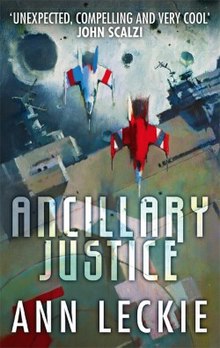One Esk is the remaining ancillary of troop carrier the Justice of Toren. She was once in the service of the Radch, the empire that conquered the galaxy but now, as we meet her, she’s as far from home as it’s possible to be.

Leckie creates two timelines – one in the present and one which explains the events nineteen years, three months and one week earlier which led to One Esk’s current situation. In the present, One Esk rescues Seivarden Vendaai, previously one of Justice of Toren’s lieutenants, from her position ‘frozen, bruised and bloody’. She takes Seivarden to the house of Dr. Arilesperas Strigan, the final stop on a nineteen-year quest where One Esk is hoping to find something which will help her take revenge. While in the past, we learn about One Esk being sent as an ancillary on duty in the city of Ors, on the planet Shis’urna. This timeline allows us to see what life was like under the rule of the Radchaai. For example, conversation at a dinner part the lieutenants are invited to turns to work.
“Besides,” Lieutenant Skaaiat said, “she’s right. Oh, not that foolishness about Orsians, no, but she’s right to be suspicious about the aptitudes. You know yourself the tests are susceptible to manipulation.” Lieutenant Awn felt a sick, betrayed indignation at Lieutenant Skaaiat’s words, but said nothing, and Lieutenant Skaaiat continued. “For centuries only the wealthy and well-connected tested as suitable for certain jobs. Like, say, officers in the military. In the last, what, fifty, seventy-five years, that hasn’t been true. Have the lesser houses suddenly begun to produce officer candidates where they didn’t before?”
Class and loyalty to the empire are just two of the themes Leckie explores. She also considers selfhood and gender. Ideas of the self are looked at through the way in which the ship’s artificial intelligence can be divided. Justice of Toren has twenty bodies – ‘And as always, in the back of my mind, a constant awareness of being in orbit overhead’– and it’s fascinating to see Leckie handle the different points of view in the chapters where these bodies still exist. There’s also a really fascinating plot twist which relates to this but which I won’t spoil. It’s mind-blowing and very creative.
Gender is most obviously considered through pronoun use; the Radchaai don’t identify gender and use the pronoun ‘she’ as universal. This causes One Esk some issues on other planets which do use gender markers but is more interesting in terms of shifting the universal ‘he’ to she. Can either be gender neutral? What consequences does an absence of gender lead to?
Ancillary Justice is an interesting but also a complicated and, at times, confusing read. Leckie attempts to do a lot – this is a space opera after all – but at the expense of clarity in the first half of the novel and skimming themes that could’ve been explored in greater depth throughout. However, I did find myself enjoying it enough to want to read the second part of the trilogy (Ancillary Sword) where I’m hoping Leckie delves deeper into some of the ideas she’s established.
I read Ancillary Justice for #ReadWomenSF. Our book(s) for August is any of Becky Chambers’ three novels. More details on Gem Todd’s blog if you’re interested in joining us. I reviewed Chambers’ debut The Long Way to a Small Angry Planet when it was longlisted for the Women’s Prize in 2016.
